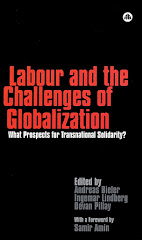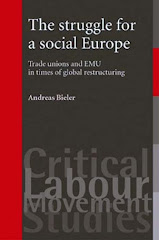In the Theses On Feuerbach, Marx famously wrote that ‘the philosophers
have only interpreted the world, in various ways; the point is to change it’ (Marx
1845). In their edited volume Marxism and Social
Movements, Colin Barker, Laurence Cox, John Krinsky and Alf Gunvald
Nilsen have lived up to this demand in that the
contributions are directly informed by, and related to, concrete struggles. The
collection of essays succeeds at not only assisting us in understanding, in
interpreting the role of social movements in current struggles. It also helps
us to reflect on strategies of resistance in order to improve them.
The book makes two major contributions.
First, it strongly establishes a Marxist approach in the understanding of
social movements. As the four editor make clear in the introduction, ‘while
feminist, ecological and anarchist thought all share [Marxism’s] movement origins,
none holds the same ability to connect the critique of structure with a
strategic analysis of social movements both as they are and as they could be –
to find within the limitations of the world as is the potential to create a new
world in the teeth of powerful opposition and structural constraints’ (P.15).
Of course, other approaches can also analyse social movements. Nevertheless, it
is only a historical materialist approach, which clarifies that exploitation is
rooted in the way the social relations of production are organised around wage
labour and the private ownership of the means of production.
Other struggles against sexism and
racism are also important, but only the struggle against capitalist wage labour
strikes at the heart of exploitation. A good example in this respect is the
analysis of the South African experience by Patrick Bond and his colleagues.
During the period of Apartheid, racism and capitalist exploitation were
overlapping and reinforcing each other. Nevertheless, defeating Apartheid did
not end capitalist exploitation. ‘We found that Apartheid was conjectural, but
uneven and combined development is systematic’ (P.53). Consequently, in order
to transform the political economy fundamentally, the social relations of production
need to be transformed and it is here that a Marxist approach to the analysis
of social movements and their resistance to capitalist exploitation is
essential.
Second, the volume successfully develops
movement-relevant research, i.e. ‘research that is attuned to and addresses the
knowledge interests of activists as opposed to merely scholastic dissections of
the character and dynamics of collective action’ (P.2). Elizabeth Humphrys’
excellent study of ‘networkers’ within the Global Justice Movement in Australia
provides a good example. Rather than simply analysing the falling apart of this
movement in the wake of 9/11, by drawing on Gramsci she identifies possible
ways forward of how these networkers could provide a more solid basis for the
organisation of a broad movement in the future. ‘Gramsci’s conception of
organic intellectuals – emerging from subaltern groupings but playing a
directive (leadership) role within them, having both knowledge and political
skills, working among fragments but seeking to transcend the partial to develop
the collective will – is a powerful theoretical solution to this problem’
(P.375).
Of course, considering the large amount
of 19 chapters in this volume, there are also differences between individual
contributions. For example, while Alf Nilsen and Laurence Cox put forward a
voluntaristic approach, in which structures are simply the result of actions by
social movements from below and social movements from above (P.64-65), Colin
Barker acknowledges that human beings do not act under conditions of their own
choosing. Rather, ‘they necessarily enter into social relations that are the
product of previous activity and independent of their will. Such social
relations possess their own “emergent properties” independent of the individuals
who compose them: for instance, divisions of labour, rules, patterns of rights
and responsibilities’ (P.47). Nevertheless, such tensions are not a problem,
but offer fertile ground for reflective thinking on how best to understand the
relationship between agency and structure and ultimately the centrality of
class struggle in bringing both together. As Barker asserts, ‘successive waves
of colonised and enslaved peoples, migrants, working women, white-collar
employees, indigenous peoples, college and school students, gays and lesbians
have all, in different ways and times, fought their way into “the social
movement in general”. In the process, they have reshaped “class struggle” and
enriched the notion of human emancipation’ (P.60).
If there is one criticism I have to make then it
is the high price of the volume, being set at a mighty €129. As relevant as the
book is for concrete struggles, it is difficult to see how many activists can actually
get access to it in the first place. I would encourage the editors to reflect
on how to make the volume more affordable for social movement activists. This
is an outstanding collection and it deserves a large readership. I strongly
recommend Marxism and Social Movements
for reading to everyone who is interested in struggles against capitalist
exploitation.
24 April 2014
Prof. Andreas Bieler
Professor of Political Economy
University of Nottingham/UK
Personal website: http://andreasbieler.net
24 April 2014













Elizabeth Humphrys:
ReplyDelete'I thought I would just let readers know the editors chose to publish the book with Brill as there is a guarantee of a cheap paperback edition (with Haymarket) 12 months after the hardcover, as well as a version with Aakar books in India. The more affordable Haymarket paperbacks will be released 2014/2015.
Brill also allow authors to put their chapters on their personal website for open access.
My chapter is available here: http://anintegralstate.files.wordpress.com/2013/06/here.pdf
Colin Barker's chapter is here: https://docs.google.com/file/d/0Bz3wUg3e6r_4d21pRW1Ea3V4WDg/preview?pli=1
Alf's chapter is here: http://shadowsoftenderfury.files.wordpress.com/2013/06/9789004211759_03-nilsen-cox.pdf
The introduction to the book is available here: http://shadowsoftenderfury.wordpress.com/2013/06/25/marxism-and-social-movements-an-introduction/
There is also a small piece I wrote about the process of the book coming together: http://left-flank.org/2013/06/23/marxism-social-movements-from-dialogue-to-printed-page
In addition to the above, Brill's MyBook Program gives users with access to e-book collections also the option to purchase a print-on-demand paperback copy of books of their choice for €25.00 / $25.00. Learn more: www.brill.com/mybook
ReplyDeleteMarxism and Social Movements now in paperback
ReplyDeleteColin Barker, Laurence Cox, John Krinsky and Alf Nilsen, eds., (2014), Marxism and social movements. Chicago: Haymarket
482pp. paperback; ISBN9781608463725
List price $36
Release date May 2014
http://www.haymarketbooks.org/pb/Marxism-and-Social-Movements